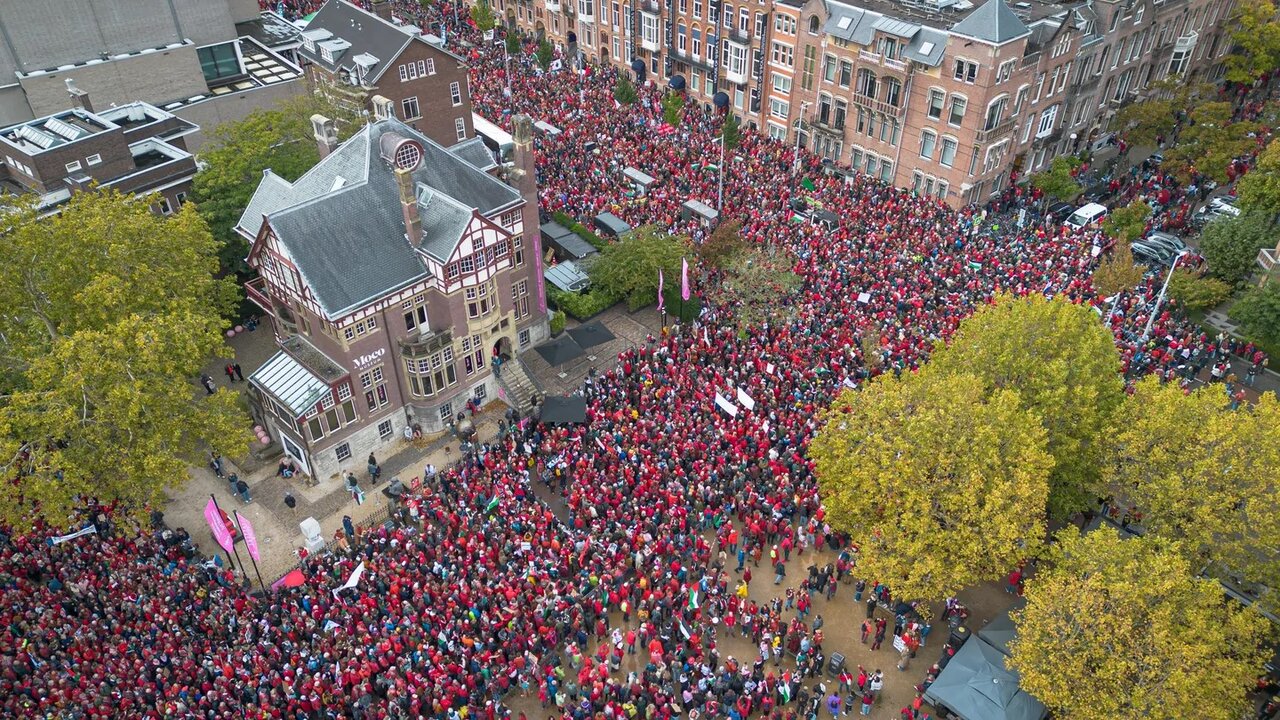Europe turns against Israeli occupation regime

TEHRAN – Mass pro-Palestine protests across Europe reflect Israel’s deepening isolation in Western public opinion.
Europe witnessed a massive wave of pro-Palestine protests over the weekend, with hundreds of thousands of people taking to the streets to denounce the Israeli genocide in Gaza and the continued support by their own governments to the Tel Aviv regime.
These protests, some of the largest seen since the genocidal war began exactly two years ago --October 7, 2023 --, reflect not only outrage at the scale of devastation in Gaza, but also a growing rift between European citizens and their political leaders.
In Amsterdam, 250,000 people joined the “Red Line March” organized by PAX Netherlands, demanding an end to arms sales to the Israeli occupation regime.
In Italy, over 2 million people participated in a general strike, with around 300,000 marching in Rome. In Spain, the cities of Madrid and Barcelona drew crowds of 90,000 and 70,000 respectively.
Other cities across the continent, from Paris and Berlin to Lisbon and Athens, also saw major demonstrations calling for an immediate end to the genocide and sanctions against the Israeli war crimes in Gaza.
The sheer size and coordination of these protests strongly indicate a striking shift in public opinion. Anger is no longer only directed at the occupation regime’s genocidal campaign in Gaza, but increasingly at Western governments who continue backing illegal occupation politically and militarily.
Protesters carried banners reading “Our governments support genocide” and “End complicity now,” underscoring a widespread belief that European leaders have ignored public sentiment and international law.
This disconnect is particularly stark in countries like Germany, where a recent poll showed that 62% of citizens believe the Zionist regime’s actions in Gaza amount to genocide.
A majority support suspending trade agreements with the regime, and two-thirds want Berlin to increase diplomatic pressure on Tel Aviv.
Similar patterns are emerging across Europe, where public support for the occupation regime has eroded dramatically since the start of the genocidal war on Gaza. Despite this, Western governments have continued to sell arms, blocked calls for sanctions, and shielded the regime from international accountability.
The genocide In Gaza, entering its third year, has been marked by large-scale civilian casualties, the destruction of hospitals and schools, and multiple war crimes documented by UN agencies.
These include collective punishment, the use of starvation as a weapon, and indiscriminate bombing of densely populated areas. As images from Gaza circulate widely on social media and in international media, the Western narrative of the Israeli regime being the victim and defending itself has collapsed in the eyes of many Europeans.
The regime once enjoyed broad Western sympathy in the immediate aftermath of the attack on October 7, 2023. But that sympathy has eroded over the past two years as the occupation regime’s military response has resulted in massive civilian suffering in Gaza.
The moral framing of the Israeli actions has shifted, and it is no longer seen by many in the West as merely defending itself but as one committing genocide with impunity.
At the heart of this growing movement is frustration with the political establishment. Protesters are not just expressing solidarity with Palestinians; they are directly confronting their own governments for enabling the regime’s genocidal campaign.
The protests over the weekend were as much about domestic policy as foreign affairs. For many, their governments’ refusal to halt arms exports, sever diplomatic ties, or call out the Israeli regime’s violations of international law represents a huge moral failure.
This deepening gap between governments and the public poses political risks, with sustained popular opposition eventually bringing down governments, especially when protests of this scale become impossible to ignore.
What began as isolated demonstrations has become a pan-European movement challenging both the Israeli regime’s government and the Western complicity that sustains it.
As Gaza continues to suffer, and the occupation regime’s military campaign shows no sign of ending, the political cost of ignoring public opinion is rising.
For European leaders, the message from the streets is clear: continued support for occupation and aggression in the face of mounting evidence of war crimes is not just a foreign policy stance, it is a crisis of legitimacy at home.
